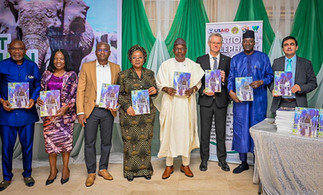Nigeria Takes Action to Protect its Surviving Elephants
- EPI Secretariat
- Aug 13, 2024
- 3 min read
Updated: Aug 20, 2024
The Federal Government of Nigeria through the Ministry of Environment, in partnership with the Elephant Protection Initiative Foundation (EPIF) and the Wildlife Conservation Society (WCS), launched Nigeria’s first ever National Elephant Action Plan (NEAP) for 2024-2034. The plan is designed to reverse the decline of Nigeria's critically endangered elephant population, currently estimated at just 300–400 individuals and on the brink of extinction.
Pictures from the NEAP launch in Abuja, Nigeria 2024
Nigeria has emerged as a major transit hub for illegal wildlife products, including nearly a quarter of the world's seized ivory. The West African country has already lost 99% of its elephants and threats such as poaching for ivory and habitat destruction still remain. Human-elephant conflict, due to crop raiding which often leads to retaliatory killings, is now the major threat to the survival of the elephants in Nigeria. NEAP was designed in response to these issues and lays out clearly and in detail the measures Nigeria must take to protect its remaining elephants, from protecting their habitat to mitigating human-elephant conflicts and cracking down on illicit trafficking of ivory.
The Federal Ministry of Environment, led by Minister Balarabe Abbas Lawal, is committed to the sustainable management and conservation of Nigeria’s natural resources. "We are dedicated to working closely with relevant stakeholders to implement the NEAP, which will guarantee the survival of elephants and their habitat in Nigeria," stated Minister Lawal.

All the attendees at Nigeria's NEAP launch event in Abuja, 2024
Nigeria will celebrate World Elephant Day with the launch of a NEAP in Abuja. The Chair of the EPI Leadership Council and former Minister of State for Environment, Sharon Ikeazor, CON, said, “The NEAP for Nigeria has been thoroughly developed by the EPI working together with WCS, and the Nigerian government through the Federal Ministry of Environment, because we are determined to save Nigeria’s remaining elephants. These iconic animals fulfil not only a vital ecological role, but they are also embedded in our country’s history and culture. We are determined to save Nigeria’s remaining elephants and enhance the economic benefits of elephant conservation for our people who live near and around the elephants.”

Elephants in Yankari Game Reserve, Nigeria
All the EPI members within the 37 African elephant range states committed themselves in 2010 to writing NEAPs to ensure a secure future for African elephants and their habitats by restoring sustainable elephant populations throughout their present and potential range. Critical to successfully achieving these goals is the development and implementation of individual National Elephant Action Plans. These plans, championed by national governments and made possible through technical and financial support from the EPI Foundation, provide a framework for effective elephant conservation on a country-by-country basis.
Andrew Dunn, WCS Nigeria Country Director, who coordinated the writing of the comprehensive plan, said, “Saving Nigeria’s last elephants will require more than just funds; it will require a significant change in attitude at all levels and a paradigm shift by federal and state governments towards a realisation that human wellbeing and global health are inextricably linked to biodiversity loss and climate change.”
The NEAP is a 10-year strategic plan developed to ensure the long-term survival of elephants in Nigeria. The plan outlines key objectives, including:
Reducing illegal elephant killings and trade through harmonised state and federal wildlife laws and enhanced law enforcement.
Maintaining elephant habitats through land-use planning and the creation of wildlife corridors to mitigate conflicts with communities.
Increasing public awareness and community-shared economic benefits generated by tourism.
Enhancing scientific knowledge and understanding of elephants to better inform efficient strategies.
Strengthening regional cooperation with neighbouring countries.
Forest elephants in Nigeria
John Scanlon AO, the CEO of the EPI Foundation, which supported the process, said, ’The situation of Nigeria’s elephants is desperate but not hopeless. This plan offers us a last chance to conserve these magnificent animals.’
Nigeria’s largest elephant population is in Yankari Game Reserve, with smaller relict populations in the forests of southern Nigeria and a transboundary herd of roughly 250 elephants using the savannah of north-eastern Nigeria as part of their range.
For more on Nigeria’s elephants, please watch this short film.
Download and read the National Elephant Action Plan below.
















